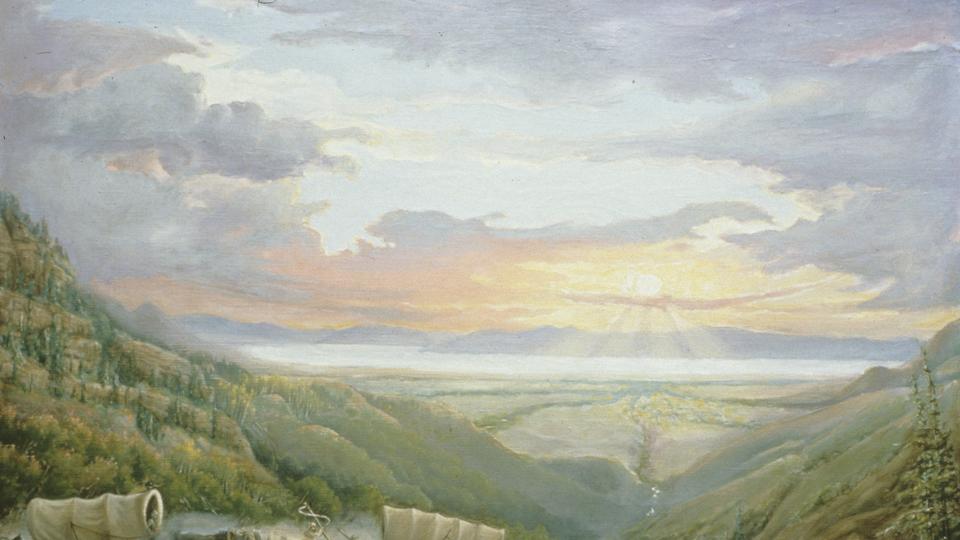 Isaiah 55:10-11
Isaiah 55:10-11
Psalm 65:10-14
Romans 8:18-23
Matthew 13:1-23
 Isaiah 55:10-11
Isaiah 55:10-11
Psalm 65:10-14
Romans 8:18-23
Matthew 13:1-23
Rich soil; ancient seed; a heart for God. Our story this morning, found in all three Synoptic Gospels, calls us to reflect on three mysteries. On earth, they are primary mysteries. Yes, it is true that a heart which seeks God is basic to everything, but we place it among the other two, for through it we draw nearer to Jesus' ominous words, "he has no root in himself" and is ruined by that fact.
During the Middle Ages this idea of all things being reduced to the one, first thing, the prima materia, so captured the imagination that it was thought to be the anima mundi, the soul, or essence, of the world. In our Franciscan world of prayer and farm, we reverence it no less and marvel that it may be applied to any and every living plant — to our crops or orchard or garden — confident that nothing is so nourishing and healthy as compost. It need not be applied in different proportions, nor deplete, damage, or subvert the soil as we must do with chemical fertilizers. Far from it. It is the universal salve and balm for everything that grows out of the ground. People make compost tea for the plant that it is in its sickbed carrying it in a tray, as it were, for the ailing patient. I have pulled 5-gallon pails of muck out of our stream and handed them off the sisters for ailing saplings, and, Voila!, the spring back to health.
I know, biologically speaking, that we live in a food chain; I know, speaking from classical physics, that every spontaneous event contributes to the disorder of the universe and that all things tend toward chaos; yet, here in the garden, one is bound to wonder at the beneficent earth that constantly tends toward good and life and balance.
Perhaps you have heard of the Gaia Principle, first articulated by the Cal Tech scientist James Lovelock, that every organism on earth works in harmony to constantly bring about earth's lifegiving properties in perfect balance. It appropriate that this insight should come from the Jet Propulsion Lab, first published in the journal Planetary Atmospheres, for look out at this universe of dead stones, and ask where else could you find such lifegiving harmony that so gladdens the soul as our beloved home, Earth? A coincidence? A random outcome? Or the constant nurturing presence of a loving God?
Next week, we will be planting clover again at the Hermitage. It fixes nitrogen in the soil, keeps the weeds down, and provides a living mulch for the Turmeric we grow. And each seed is roughly the size of the point of a pin. Yet, all of these contain their own instruction sets and, oh yes, life! Who has done this? Who could have done this? The moment that tiny seed meets with the compost and soil, we shall watch a beguiling motion unfold taking its own place in the symphony of organisms constantly tending toward more and more and more life. Soil and seed. The words alone are cause for reverence and an invitation into a lifetime of reflection.
The teenage Saint Francis, alienated from affluence, selfishness, and the war that results from these, sat alone in the ruin of an old chapel, the Church of Saint Mary and the Angels, (also called Little Portion for the land that it sat on) and stared at a San Damiano Cross, which hung there midst the rubble. Through long silences, he sat and pondered. The world he knew was cruel and without a soul; the Church he knew was little better, ... as his disciple Anthony later would later say, sexually depraved and utterly corrupt. But what was he to do, standing at the beginning of a lifetime? Could he follow the Cathars, now seen everywhere in Europe dressed in white and preaching purity in reply to the pervasive sexual perversion and corruption of the Church? What would he do? And then, staring at the cross, he heard the Lord Jesus speak to Him: "Francis, rebuild my Church, for you see it is falling down." Rebuild the church? How could one be obedient to such a command as this? And so, he began the work of rebuilding the Chapel of St. Mary and the Angels. He picked up the heavy cut stones that lay about near ruined walls, and set one upon another. Soon, his friends joined him drawing strength from the fact that they were doing something. And from this little seed, would grow the greatest Christian spiritual movement in history, second only to the Advent of Christ itself. And who among us has a heart for this?
A heart for God is deep, rich soil, and when He sets a seed within it, the soil receives it as a holy sacrament, and knows itself to be good and having a power that we dimly apprehend. We look about us in the twenty-first century and ponder. Perhaps we will hear a still, small voice: "Francis, rebuild my Creation, for you see it is falling down." Rebuild the Creation? How could one be obedient to such a command as this? For our world is, literally, so broken. The solution is as mysterious as the command, and both are to be trusted completely.
|
First, do no harm.
Have compassion. Do not sin. Sit silently. Press two hands together offering God your love. And walk lightly on the earth, for it is His sacred ground. In the Name of the Father and of the Son of the Holy Ghost. Amen. |